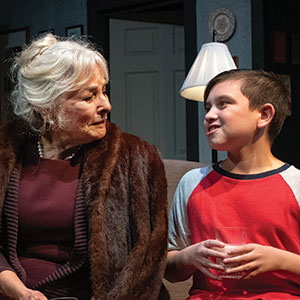

Andre, Cal’s ex, died of AIDS 20 years before the beginning of Terrence McNally’s Mothers and Sons. Andre never appears on stage, but his ghost haunts the entire production. When Andre’s recently widowed mother Katharine (Lillian Bogovich) shows up unannounced at Cal’s apartment, he casually mentions that he lives there with his husband, Will (Max Tachis).
Katharine winces in response. As a proxy for her son, she’s melodramatically play-acting the feeling of betrayal. To resent the fact that Cal (Damian Vega) has moved on with his lifetwo decades after Andre’s deathreads as a labored overreaction in the timeline of a mother’s grief.
It’s not clear to Cal, or to Katharine herself, why she’s made this visit. Cal, and later Will, both ask her what she’s there for, but she ignores their questions. She’s striking the pose of a tragic Greek heroine in mourning and hunting for vengeance. But her declarations of woe sound hollow. Since her husband’s death, Katharine has had nothing to replace the role, however constricting, of being someone’s wife. So her visit feels exploratory. She examines the house as if she were Cal’s mother-in-law. It slowly dawns on herthis is what her son’s life would have looked like had he lived. Katharine starts to misdirect her anger at Cal.
An unspoken question that McNally implies but never articulates is, What if Katharine had been a loving mother who had accepted her gay son? Would Andre’s life have turned out any differently? The playwright structures Mothers and Sons as a series of confrontations. Some of them develop into arguments. Others fizzle out. Some reveal truths about the past. Cal reminds Katharine that he cared for Andre during his illness. He fed and bathed him until he died, while the most she could bring herself to do was attend the funeral. After all these years, her son’s death hasn’t improved her disposition. Katharine is alternately cold or enraged and filled with bitterness. For Cal and Will, it’s puzzling that she’s chosen this moment to have a breakdown, and to have it in their house.
Of the three main performers, Tachis is the most relaxed on stage. He’s the very definition of a natural. As Cal’s younger husband, and Andre’s replacement, Tachis knows exactly who Will is. He’s a man who’s content with the life he’s built with Cal and their son Bud (Izaiah Gutierrez). And he hasn’t had to sacrifice his gay identity to achieve any of it. Will represents the first generation of gay men who didn’t closet themselves away from their families, friends or co-workers. Katharine’s disapproval means nothing to him. It’s refreshing to see a gay character who can deliver sarcastic quips without that being his only defining trait. He’s also smart, loving and confident.
Bogovich has the most unfortunate role. She has to play an unlikable character, determinedly disinterested in redemption. McNally’s Katharine has a lot in common with Edward Albee’s frigid, emotionally distant matriarchs. But what does a matriarch become when her progeny die out? Katharine lacks empathy and imagination. Her disposition is marked by a hard-edged line of cruelty. It’s a wonder that Cal lets her get past the front door. When he brings out an old framed poster of Andre, who was once a promising actor, Katharine recoils from it. The only emotions that she allows for her son are self-pity and disgust. She must be a joyless character to inhabit.
Cal is a kind, straightforward man who’s befuddled by Katharine’s arrival. He tells her it was eight years after Andre died before he contemplated having another relationship. In one of Cal’s monologues, McNally casually slips in a footnote about gay history. Cal remarks that when he and Andre were together, there wasn’t an adequate term to describe what they meant to each other. There were unsatisfying terms like “boyfriend,” “lover” or “partner.” And, without legal gay marriage, “husband” was out of reach. When he rhapsodizes about finally being able to call Will his husband, McNally has zeroed in on what gay liberation means to the ordinary individual.
It’s Cal looking Katharine in the eye and saying, my life, my marriage, my husband and our son are immune to the way people like you have treated us in the past. It wasn’t that he could accept her intolerance when Andre was alive; he just couldn’t openly defy it. Now he and Will have manifested what gay pride means for them. They’re thriving while Katharine’s small-mindedness has led her into a period of decline. She’s incapable of love, even retroactively, preferring a life of self-loathing instead.
Mothers and Sons
Thru Feb 17, $21+
City Lights Theater Company
cltc.org


